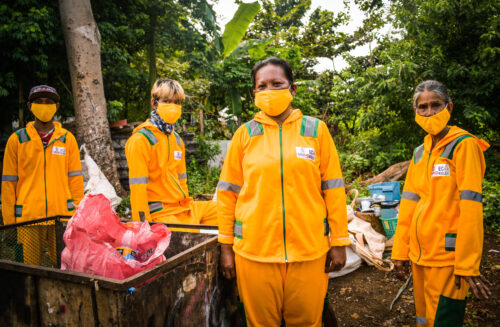Advancing a Circular Economy and Empowering the Informal Waste Sector

The informal waste sector is critical for creating a more circular economy and helping to end plastic pollution. Informal waste collectors are the foundation of waste collection, sorting, and recycling—they are responsible for over half of all plastic waste collected and recycled globally. The informal waste sector is one of the world’s greatest defenses against ocean plastic pollution, especially in coastal, urban areas, and in places where the formal sector does not adequately respond to waste management needs. Despite their importance, informal waste workers are commonly overlooked, undervalued, and under resourced, facing major challenges such as:
Stigmatization, marginalization, and high risks – Across the world, especially in low- and middle-income countries, the informal waste sector usually represents the most vulnerable and socially disadvantaged groups in society. Informal waste workers frequently face exploitation, social exclusion, and marginalization. Communities often see waste collection as a desperate source of daily living; collectors can be subject to stigma, harassment, and even violence. Informal waste workers have little access to basic personal protective equipment and tools—such as carts—increasing the risk associated with the work. Their activities are characterized by unsafe and unhealthy working conditions, low or irregular incomes, long working hours, and a lack of access to markets, finance, training, and technology.
Insufficient inclusion of workers in decision making – Informal waste workers lack political and legal representation, which makes it difficult for them to influence decision making in solid waste management policies. Major decisions that impact the waste sector and worker livelihoods—such as dumpsite closures—are often made without workers’ participation. During such critical transitions as dumpsite closures, the exclusion of informal waste workers can lead to the loss of local know-how, the breakup of recycling value chains, and the disruption of vital income generating activities for the poorest in society.
Barriers for women’s participation in the waste sector – Women face structural barriers to fully participate in the waste value chain. In both the formal and informal sectors, women lack access to finance, training, and market information, as well as the ability to move into leadership roles. They collect lower value plastics, earn lower wages than their male colleagues, and face widespread discrimination and sexual harassment and violence (further decreasing their full participation). As the predominant collectors and sorters of waste, women work in dangerous conditions with little or no protective equipment, doing the riskiest work for the lowest pay while disproportionately burdened with childcare and household responsibilities.
Impact of global trends on informal worker livelihoods – Informal waste worker livelihoods are highly vulnerable toglobal trends and events such as volatile oil prices, COVID-19 and the resulting recession, and the effects of climate change. These realities have resulted in a waning market demand for recyclables and are compounded by increased competition for waste sector jobs to replace other sources of lost income.
The fact sheet can be downloaded here.

